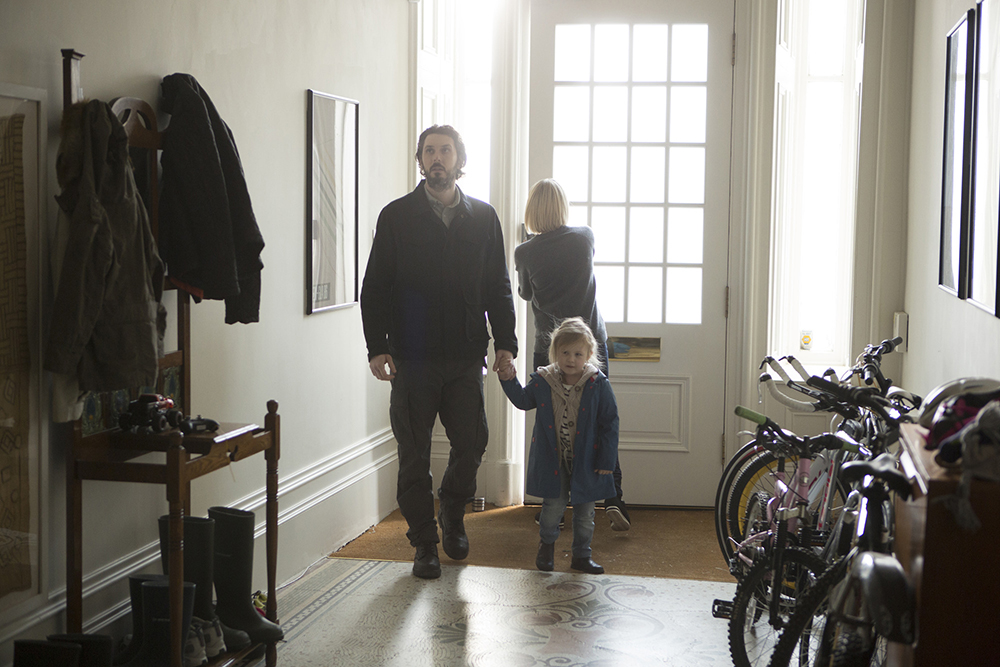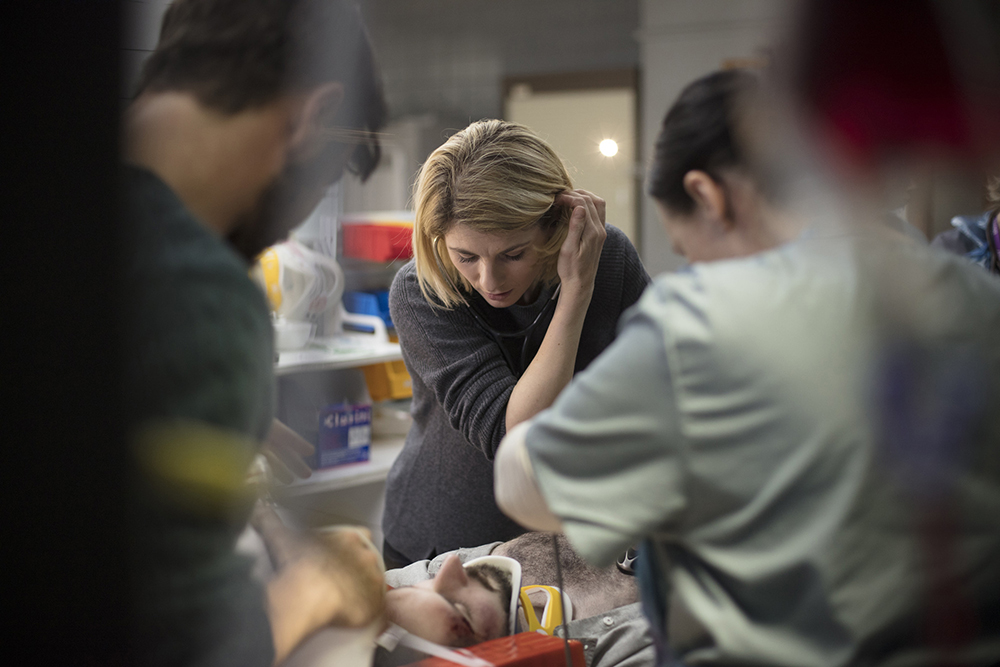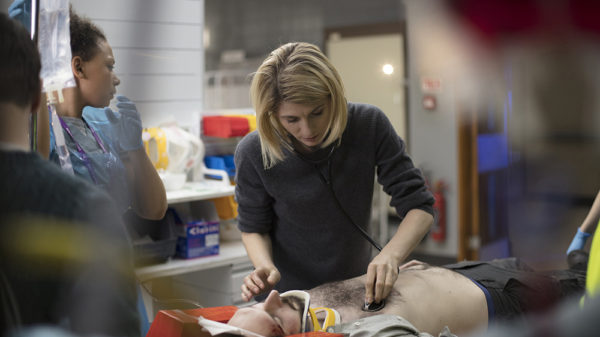Here’s our spoiler-filled review of Trust Me episode 4.
At a pivotal point in this finale episode of Trust Me, Cath’s ex-partner Karl incredulously asks her “Who the f*** are you?”
By that time, it felt as if he was speaking on behalf of the entire audience.
As she squirms to extricate herself from a mess she has calculatingly created, it felt like I was still trying to get a handle on her character – indeed, most of the characters in this piece. There’s simply nothing to grip, though, everything’s too fluid. Every character just seems to be reacting by that point – the script’s bloody minded unwillingness to condemn her actions has sucked everything in past its event horizon and consumed all sense.

It would appear that the rather bleak theme of the whole drama is that nothing and nobody in this world is what they seem to be, and I get that that’s a thing. Accepted, nobody is just a good person and a great nurse, just a drinking and gambling waste of space, just an alcoholic, just ‘Doctor Perfect’. However, in the heightened, compressed, world of TV drama, by the time every central character in Trust Me has been several – polar opposite – things in a relatively short space of time screen time, you’re left with nothing to hang on to as the action swirls around you.
For me, watching this final episode was enough to induce seasickness, without a wave in sight. TV, to some extent, relies on shorthand and archetypes – play with the rules, and you better have a damn good outcome to work towards. By the time Andy tries to sate our need for meaning by concluding that ‘life and death is all that matters’, it’s simply not enough. It’s also simply not true. People and honesty also matter, just not in Trust Me. At least not when it needs to ignore them.

Trust Me has always wanted to have its cake and eat it. To play with heightened, dramatic, directorial devices and high-concept deceptions, while clinging to an air of realism; to have its central character engage in the most heinous deceptions yet have us sympathise with her. In a very real sense, it’s all become a bit nauseating; comfortable viewing it isn’t, not because of the dramatic tension, but because it’s so tonally fluid. Often shifting quickly, to dissonant keys.
In the space of 30 minutes, Cath/Ally goes from plotting to throw Bridget under a bus with her romantic interest Andy; to being the martyr trying to take the blame for the traumatic events of the last episode; to saving a man’s life in an almost-unwatchably tense re-run of previous events; to making a second mistake that nearly costs the life of Mona, one character in the whole affair we can reliably have sympathy for (other than Molly, poor thing); to suffering something akin to a nervous breakdown, revealing all to her ex and seeming contrite; to threatening him in the most aggressive, manipulative way; to begging him to take her back to Sheffield and heading to her new home to pack up without as much as a word to current new beau, which – by the way – her ex knows nothing about. If your head’s spinning from reading that, you maybe get my point.

Alongside this we’ve seen Andy’s transition from nice-guy likeable Mr. Reliable Doctor to some kind of monster who’s willing to betray everything he would have signed up for when he took the Hippocratic Oath in order to defend and protect a fraudster rather than offer a hand in help to someone who he’s worked with for a long time.
Also, there’s an attempt to create sympathy for Bridget, the demon of last week’s finale – and the nicest character in the whole hospital, Lois Chimimba’s Karen, has had a snap at her beau Charlie for no apparent reason, and… Oh, I give up.
By thirty-three minutes in, and Karl’s ‘voice of the audience’ outburst – which is where I started this review a million years ago – there was no knowing how it was going to end. Trouble was, by then I really didn’t care. When everyone’s awful who do you root for? When there’s nothing to root for in a drama, what’s there to get tense about?
Even as the mirror image men of Cath/Ally’s two lives finally butt heads in some sort of stag-like rutting contest over her, there’s nothing really at stake. Which horrible person does the horrible person choose? Does it really matter?
By the time Karl hits the nail on the head once more, with the astute observation that “Jesus Christ, this is insane”, it’s beginning to feel like even the writer is crying out for help. Karl’s reward for being the only marginally sane person in the episode – of course – is a death sentence.
Thus we have Molly’s one-minute disappearance and a driver that can’t see someone standing right there in the middle of a seemingly open road. It’s a plot device that has nothing to do with what we’ve spent three hours building up to. Like a lot of high-concept series, Trust Me has, by then tied itself up in knots it’s fighting to extricate itself from… Thankfully, I think – and unlike the similar serpentine character twists we see in some American shows – it only took four episodes to do it. Thus, I get to sigh and be disappointed quicker, and can carry on with my life.

Any good film crew, and this is made by a damn good film crew, could have dropped us right into them all running around the house shouting for Molly, showed us everything that come in the minutes afterwards with no real context, and it would still have been tense. Nothing from the rest of the show mattered at that point, which strikes me as a disappointing assessment of a four hour TV drama.
Then there’s the confusing, ‘did Andy kill Karl’, twist… Which is shot and edited as if even the director didn’t actually know whether he did it – or as if someone changed their mind at the last minute. And finally, we get the moment I’d personally been dreading: Cath getting away with it.
Sadly, Trust Me even manages to make this tonally awkward with its defiant unwillingness to let Jodie Whittaker play it with a more duplicitous tenor. I was going to write this off as an extremely well made, well acted, entertaining mess of a show that hung itself on its own high-concept. However, that it couldn’t fully commit to the pitch black idea that an innocent-ish man had to die in order for a fraudster to carry on living her life putting people at risk every day alongside a possible murderer, is – frankly – unforgivable.
I would, probably, have taken Cath/Ally being trapped in a devil’s deal with a man she couldn’t trust as comeuppance for her crimes – a metaphorical prison, rather than a real one. Instead, however, we see Ally getting a promotion, punctuated by what’s virtually a smug wink from Andy, before we see her striding through the Emergency Department smiling like it’s some kind of victory parade. That was a crazy caper, eh?
It’s meant to make us feel uneasy, I’m sure. I don’t, however, think it was going for ‘what the hell was that?’ kind of uneasiness.
What’s the point here? If you’re willing to betray all the honesty your father tried to instil in you and live a lie, you’ll get a tidy bit of extra cash each month for your trouble? If you want to become middle class, you’ve gotta be willing to give up all morals you ever clung too? Living with a man with the means, motive and opportunity to commit a murder – and whom you suspect – is okay as long as he tells you he didn’t do it? I’m confused.
Trust Me was a well shot, well acted slice of prime time TV with genuine moments of grit and tension. I was entertained. Jodie Whittaker proved to be a truly engaging lead actress, capable of grabbing your attention and holding it at every turn.
It is indeed a show that fell victim to its own machinations, but more so to its lack of bravery when it came to seeing its central conceit through to a satisfying conclusion.

